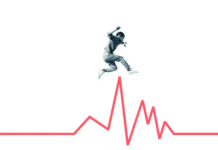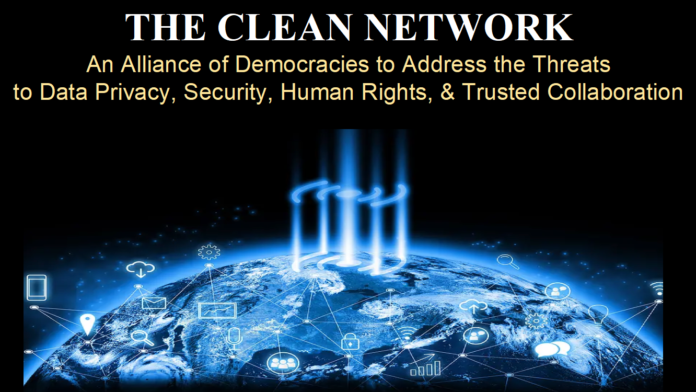

How the Clean Network Alliance of Democracies Turned the Tide on Huawei in 5G
A three article series containing seven parts on The Clean Network
How the Clean Network Alliance of Democracies… >> Next >> Last
by Michael Mink
Part I
Uphill 5G Battle
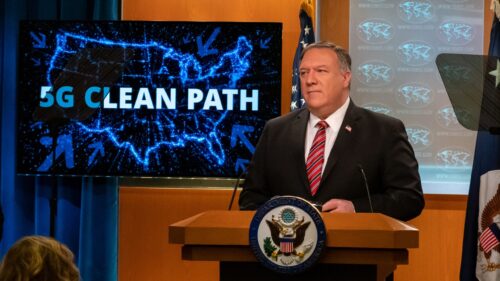
On April 29, 2020, U.S. Secretary of State Mike Pompeo walked up to the podium to announce the Clean Path initiative to protect 5G network traffic entering U.S. diplomatic facilities. By that time, the world was convinced it was too late to prevent 5G vendors sponsored by the Chinese Communist Party (CCP) from dominating the next generation of global telecommunications. Washington officials of both parties feared that Beijing could control—and even deny the U.S. and its allies access to—the 5G networks that make global commerce and the projection of military power possible.
The U.S. gave increasingly dire warnings about the risks of reliance on Chinese technologies, but the steady march toward acceptance of Huawei seemed irresistible. The United Kingdom was committed to granting Huawei a role in building parts of the country’s new 5G network. The British Finance Minister, Philip Hammond, even said that while networks needed to be secure, they also had to be competitive. The government believed the best way to do that was by utilizing some of Huawei’s technology.
Huawei warned that its ban would require removing existing network equipment which would cost hundreds of millions, or even billions, of dollars and delay building a new 5G by as much as 18 months.
Another strong NATO ally, Germany, Europe’s economic giant and largest telecommunication market, resisted full support for the Clean Network. Chancellor Angela Merkel even supported Huawei publicly. “Huawei’s technology is deeply embedded in Germany’s existing telecom infrastructure,” Politico.eu wrote. “Major German telecoms have worked closely with Huawei to accelerate building of the country’s 5G network.”
The German government had for many months disagreed on how to handle the issue amid fears that it could delay 5G networks and cause trade tensions with Beijing. To further pressure Germany, the Chinese ambassador to Germany even went so far as to make overt threats that the Chinese car market would be off limits to German automakers if Germany banned Huawei from its 5G networks.
In January 2020, the UK’s decision to allow Huawei into its 5G network sparked tensions between London and the Trump administration. It looked like the Chinese tech vendor was going to run the table in Europe. White House representatives warned it would be “nothing short of madness” to include the Chinese company in telecoms infrastructure, and that intelligence-sharing would be at risk if Britain went ahead.
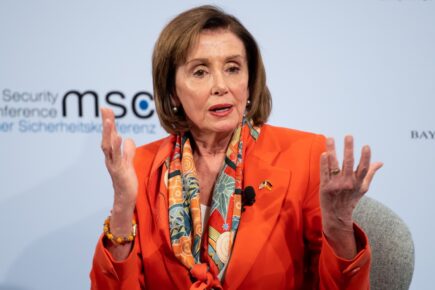
At the 2020 Munich Security Conference in February, Speaker Nancy Pelosi warned European countries they will “choose autocracy over democracy” if they let Huawei take part in rolling out 5G technology, in a sign of the bipartisan US political pressure over the Chinese company. She added it would be the “most insidious form of aggression” if 5G communications were to come under the control of an “anti-democratic government.”
A few days later at a press conference in London, Huawei’s president of carrier business Ryan Ding boasted, “We have 91 commercial 5G contracts worldwide, including 47 from Europe.”
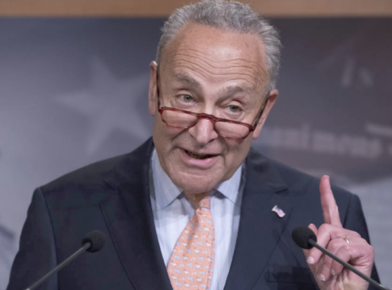
In March, Senate Minority Leader Chuck Schumer (D-NY) led a bipartisan group of Senators in urging Parliament to reconsider the Johnson government’s decision to allow Huawei to supply some of the United Kingdom’s 5G telecommunications infrastructure. Saying, “Given the significant security, privacy, and economic threats posed by Huawei, we strongly urge the United Kingdom to revisit its recent decision, take steps to mitigate the risks of Huawei, and work in close partnership with the U.S. on such efforts going forward.”
U.S. State Department Steps Up
The rise of Huawei was the fulfillment of decades of careful planning. Supported by the CCP, Huawei benefitted from state protection against foreign competitors, billions in funding from the Chinese government, as well as forced technology transfers and well documented instances of outright technology theft. The reason was clear and perhaps best described by Secretary of State Mike Pompeo: “Huawei was a trojan horse for Chinese intelligence and the CCP surveillance-state.”
Huawei leadership, and the CCP, spent years maneuvering the company into this position. Huawei was founded in 1987 by Ren Zhengfei, a veteran of the People’s Liberation Army’s engineering corps. Many of the company’s crucial first contracts were with the Chinese army. As Huawei grew, it benefitted from both state support and stolen technology.
In 1996, the Chinese government banned competition from foreign suppliers, and there is compelling evidence that Huawei received a massive $30 billion line of credit from the China Development Bank, along with other state-backed financing. This gave the company a lock on the Chinese domestic market and enabled it to fuel rapid international expansion by offering deep discounts. Forced technology transfers from foreign companies, and several cases of technology theft also drove the company’s rise, including the well-documented theft of router software from Cisco.
The Clean Path initiative announced that day in April was the first of several Clean Network strategic chess moves designed by Under Secretary of State Keith Krach, a Silicon Valley veteran who was uniquely qualified for his mission of developing a global economic security strategy and operationalizing its 5G plan. At the time of the announcement, Huawei’s leadership position and momentum seemed unbeatable.
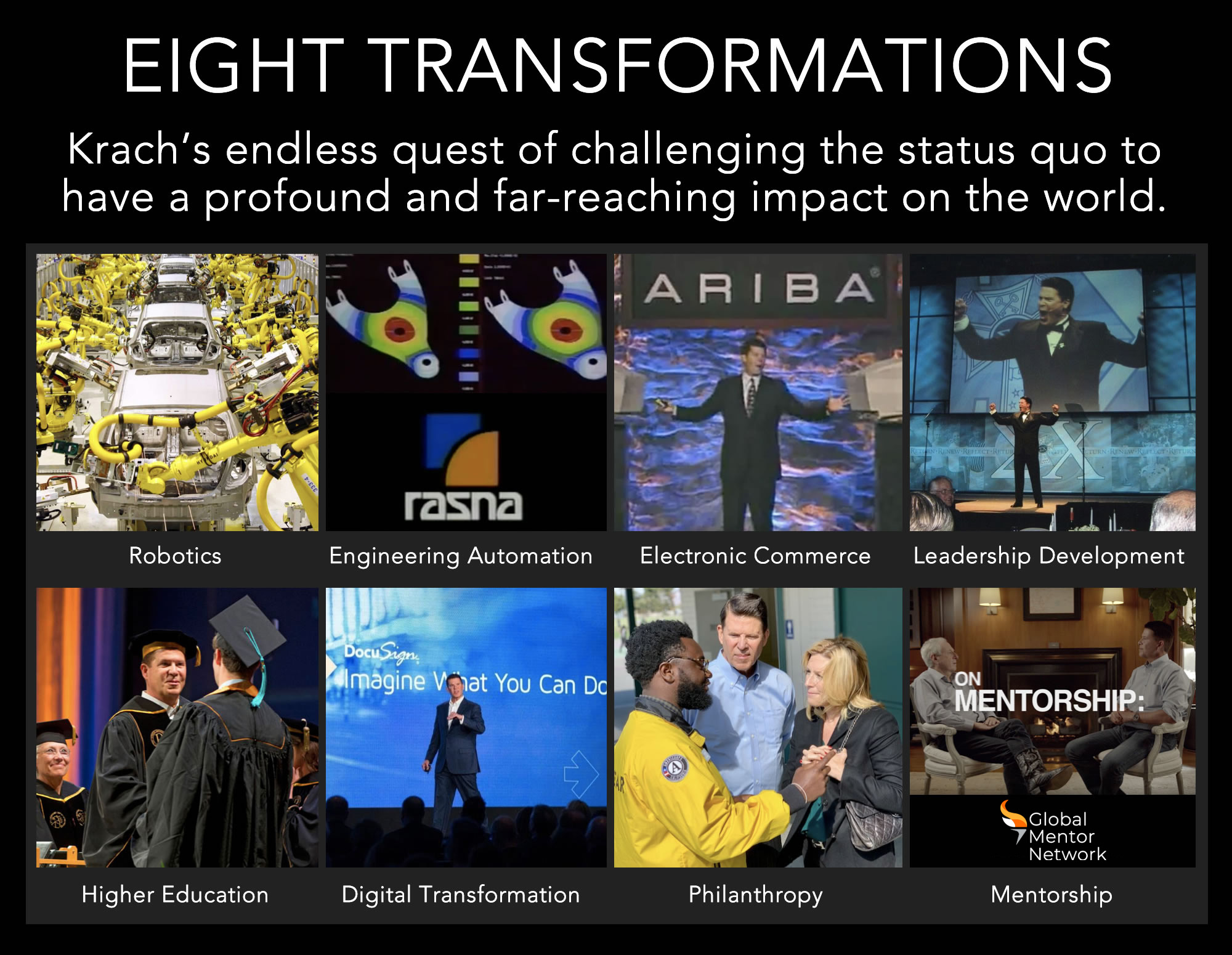
However, Krach had a proven track record of building high-performance teams and market-leading companies by constructing global networks. His transformational companies had disrupted everything from industrial robotics, design engineering, global commerce, and even the way people sign.
Krach: 2018 Life & News Transformational Leader of the Year
The Initiative that Turned the Tide
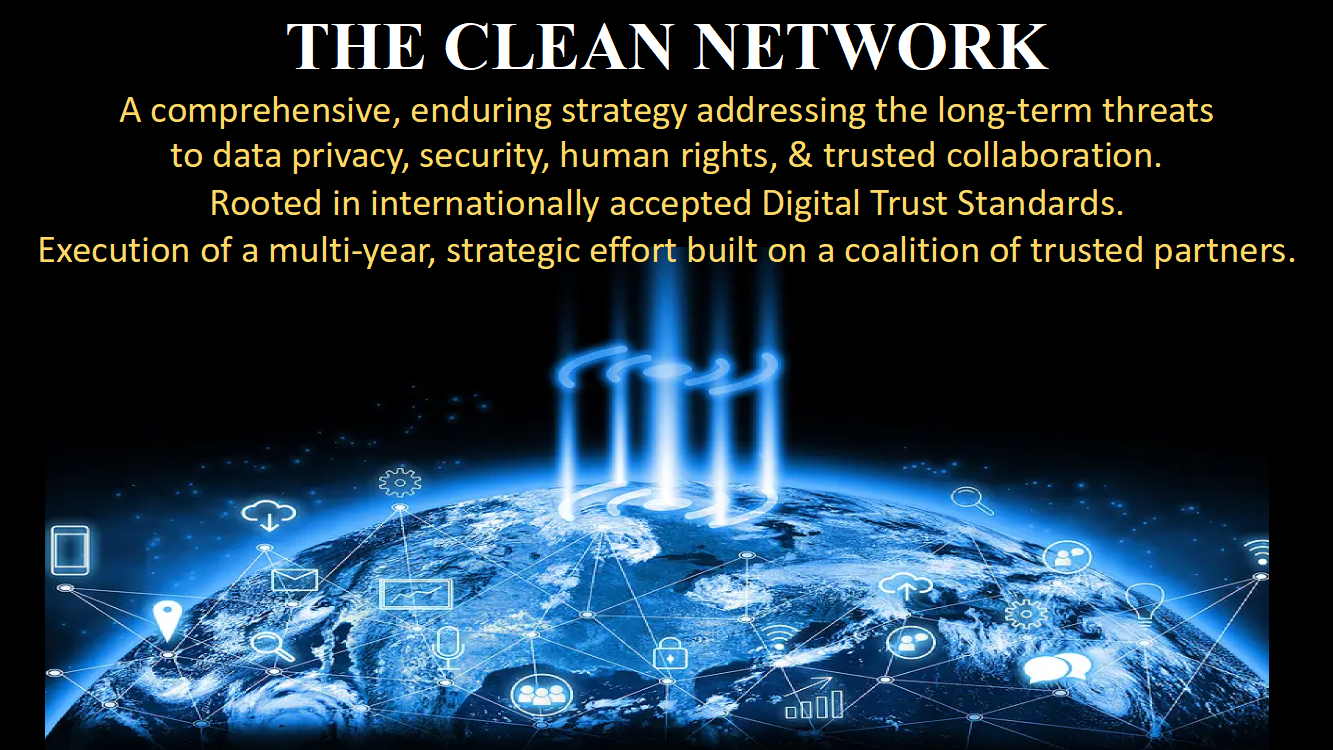
Krach had recruited a team of a dozen results-oriented executives and partnered them up with a diverse set of State Department career officers. The team was convinced the stakes were so high for 5G that this was a battle the U.S. simply could not lose.
They knew that as China’s only company with a worldwide brand, Huawei could give the CCP command of the 5G technologies that underpin commerce and communications for the entire world—the central nervous system of the 21st-century economy. Through Huawei, Beijing was poised to extend its reach to developing nations, collect massive amounts of data to feed its AI machine, and access intellectual property to transfer to their state-owned enterprises and national champions.
Krach borrowed an old play from previous successes, forming a network of partners based on trust and rooted in internationally accepted standards. It was this formula that resulted in the Clean Network— an alliance of democracies, companies, and civil society, with a comprehensive approach to addressing long-term threats to data privacy, security, human rights, and trusted collaboration. It represents the execution of a multi-year, comprehensive enduring strategy, based on democratic values.
It was designed to be a bi-partisan, enduring strategy in the epic battle of freedom versus authoritarianism.
| Bipartisan Support from the Beginning
Senator Rob Portman stated, “The job he has been nominated for is really vital to our country right now. He could not be taking the post at a more crucial time for our country. There is no doubt in my mind that Keith is up to this task…” “He’s a natural leader. I know he will serve this nation with distinction.” Senator Chris Coons asked what approach he would take for dealing with the China Challenge. Krach responded saying “it would consist of a harnessing three facets of U.S. competitive advantage by: strengthening our partnerships with our friends and allies; leveraging the innovation and resources of our private sector; and amplifying the moral high ground of our democratic values.” Senator Coons responded, “I could not agree with you more.” These are now the 3-pillars that underlie the Clean Network. Democratic Senator Cardin commented on Krach’s Senate testimony, “Mr. Krach, I must tell you I have listened to many testimonies before our committee, and yours was one of the most impressive I have heard.” Krach went on to be unanimously confirmed by the Senate. With Krach’s leadership and the clear bipartisanship backing for the Clean Network it’s a good bet that this enduring strategy will continue to be pursued. |
The Clean Network Today
Krach and his team executed their strategy with travels to Asia, Europe, the Middle East, and Latin America to secure commitments from governments, telecom operators and industry leading companies to join this rapidly growing coalition.
Two weeks ago, Brazil became the 50th Clean Network member, followed by Ecuador, Jamaica, and the Dominican Republic. In just six months, the Clean Network has grown to over 50 Clean Countries, representing 2/3 of the world’s GDP—180 Clean Telcos and many industry-leading Clean Companies like Oracle, Fujitsu, Cisco, Siemens, VMware, NEC, and HP.
This alliance of democracies now includes 26 of the 27 EU member states along with technology savvy nations like Japan, Israel, Australia, Singapore, Taiwan, Canada, Vietnam, New Zealand, and India. The Clean Network partners also include an increasing list of global heavyweights like NATO Deputy Secretary General Mircea Geoana, EU Commissioner Thierry Breton, Chairwoman of the Three Seas Initiative and Estonian President Kersti Kaljulaid.
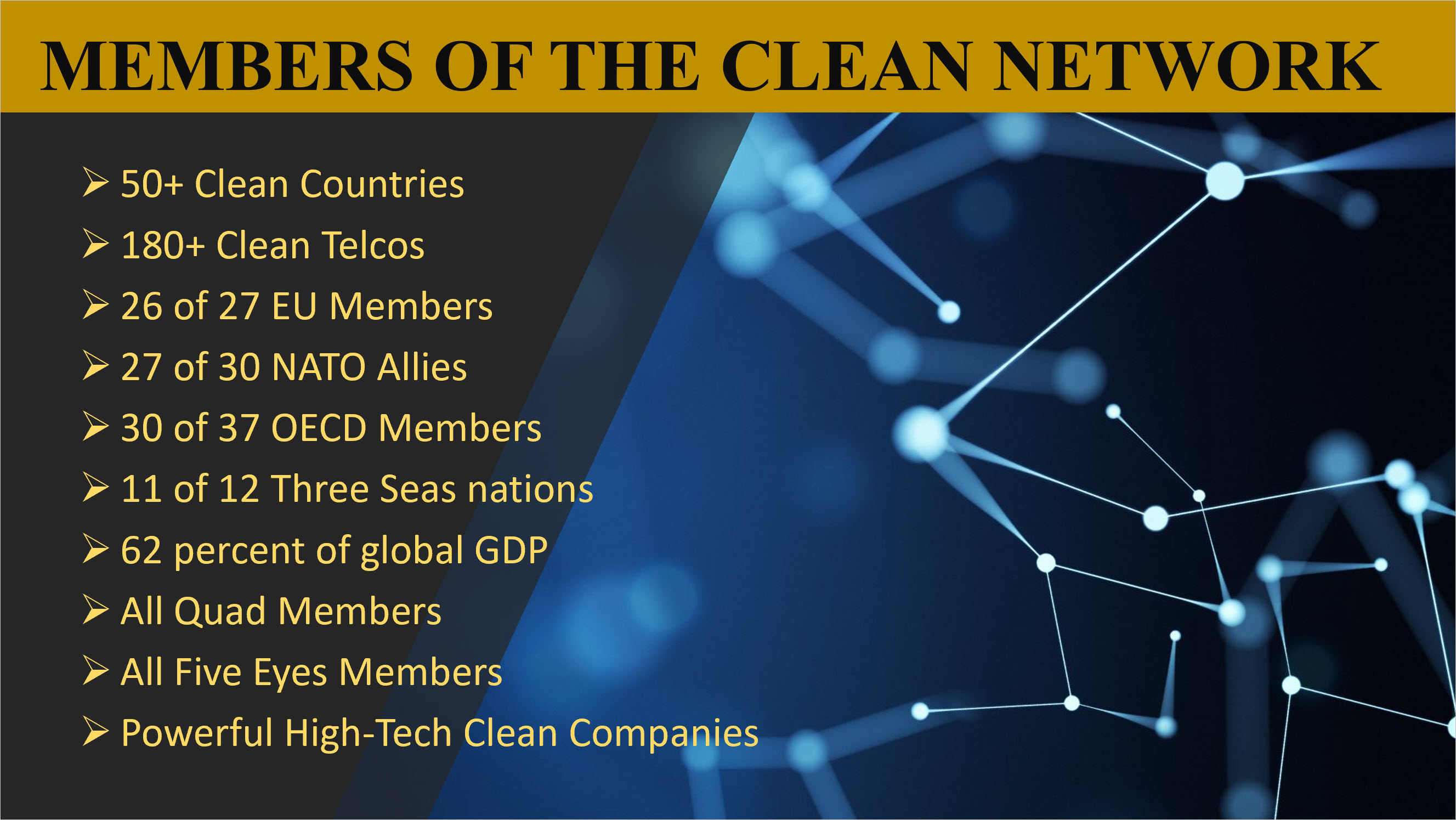
The Clean Network’s momentum has turned the tide on Huawei and the CCP’s 5G master plan. By building an alliance of democracies built on democratic values embodied in its Trust Standards, it has garnered overwhelming international support and bipartisan backing.
Remarkably, Huawei’s vaunted 90 deals have dwindled to a mere 12 outside of China. It has proven that China Inc. is beatable and, in the process, exposed its biggest weakness— lack of trust.
Part II
The Clean Network Playbook
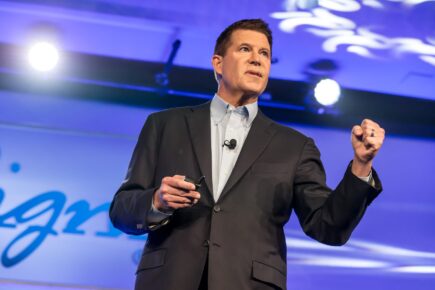
Strategic Positioning – It’s All About Trust
When he was running DocuSign, Krach frequently said, “Trust is the most powerful word in any language. It’s the basis of every important relationship—personal, business, or otherwise. You buy from people you trust. You partner with people you trust.”
The CCP utilizes 5G in its 21st century Big Brother surveillance state, and Huawei is the backbone for this—with the help of an all-encompassing network of cameras, biometrics, apps, data centers, clouds, drones, digital currency, and underwater cable. Most countries understand that the national, economic, and personal security risks of letting the CCP control the data flowing over their networks far outweigh any short-term monetary gains offered by cut-rate prices enabled by CCP subsidies.
“However, the 800-pound elephant in the room is always the CCP’s intimidation, retribution and retaliation. Countries and companies are terrified of retaliation,” Krach said. “You see examples of their bullying all over the world. The one thing that I do know is that when you’re confronted by a bully, they back down when you confront them back. And they really back down if you have your friends by your side.”
According to Krach, “If you look at all the Clean Network members in the transatlantic alliance, Asia Pacific and around the world, there is strength in numbers and there is power in unity when we in solidarity stand up to authoritarian regimes.”
Most crucial is the reality that a trusted Clean Network could not be done alone. Krach explains, “It’s a team sport and will require the synergistic effect across all our governments, as well as our powerful private sectors.”
Listening to the Customer
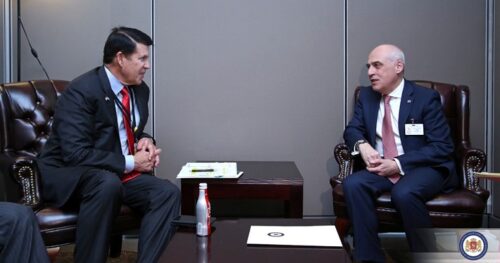
Facing seemingly insurmountable odds, Krach and his State Department team dug deep and began with the most crucial exercise: listening. Krach, as a Silicon Valley veteran and CEO of multiple billion dollar companies, brings a businessman’s perspective and experience to his diplomatic position. He believed that the place to begin is listening to your customer. So he and his team went on a “listening tour,” conducting dozens of bilateral meetings with international counterparts.
When the discussions turned to China, ministers repeatedly affirmed that China was one of their top trading partners, and then furtively whispered “but we don’t trust them.” Many shared their shame in having trusted Chinese investors and partners, only to have their own intellectual property, proprietary technology and data outright stolen from them.
Krach also had personal experience with Chinese intellectual property theft from his days as a Silicon Valley CEO. He knew that his former colleagues from the private sector felt the same way as German business leaders who confided in him.
However, it was not until he arrived at the State Department that he learned that companies like Huawei Technologies, ZTE Corporation and other major Chinese players are bound by China’s National Intelligence Law. This law requires any Chinese company—state owned or otherwise—to turn over any information, proprietary technology, intellectual property, or data, upon request to the Chinese Communist Party (CCP) government. It became crystal clear that allowing Huawei to pursue its strategy of a domination would create a worldwide monopoly creating irreparable damage. He believed that the U.S. had to fight this form of 21st century economic warfare by providing a democratic alternative.
Building the Clean Network Team
Charged with developing and operationalizing a global economic security strategy that drives economic growth, maximizes national security and combat’s the CCP’s economic aggression, Krach went to work empowering his high-performance team and recruiting a broad network of “honorary E-Team members” across U.S. government and private sector. They provided valuable input to build the Clean Network Playbook. Krach believes fully, “People support what they help create.”
The Playbook
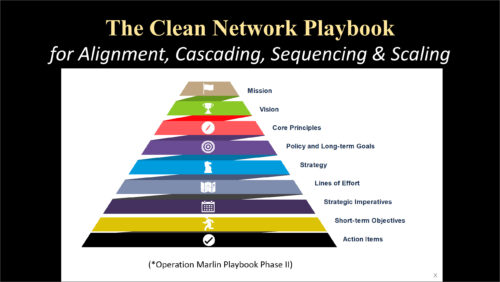
As he’s done time and time again, Krach was now ready to align his team around a shared playbook—the mission, vision, principles, goals, and strategy. This would enable rapid scaling to drive their execution forward together into lines of effort, short term objectives and action items.
Mission
The mission of the Clean Network team is to build an Alliance of Democracies by harnessing the synergies of the U.S. Government, the Private Sector and Allies that leverage U.S. comparative advantages, any existing initiatives and shared democratic values in the epic battle between freedom vs. authoritarianism
Vision
The Playbook inspires a bold vision of leading an alliance of democracies for the noble purpose of advancing freedom and prosperity. It calls for unifying a network of trusted partners to stand up against the growing threat of authoritarianism by catalyzing and inspiring a worldwide movement.
Core Principles
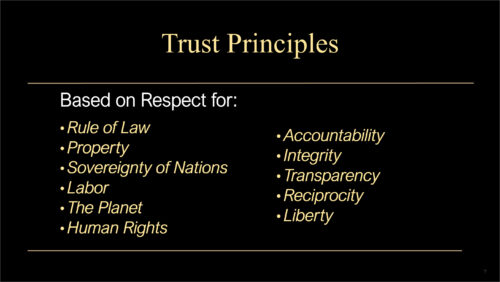
Clean Network partnerships are grounded in democratic values that form the basis of trust: integrity, accountability, transparency, reciprocity, and respect for the rule of law, property, labor, sovereignty, human rights, and the planet. This offers members of the network confidence by creating a high-integrity, level playing field for reliable collaboration with the understanding that there is no prosperity without liberty.
Mounting the Offensive
Krach has proven he can innovate at massive scale with lightning speed to disrupt hi-tech markets and understands in a rapidly changing market, leadership is not defined by size, but by momentum. The competitive goal was to take away Huawei momentum by unifying allies, leveraging trusted relationships, and creating a rolling thunder of wins and announcements.
Krach’s experience has taught him that the fastest way to construct a network is to build a network of networks as evidenced by integrating with the Clean EU 5G Cybersecurity Toolbox, collaborating on the Clean 5G NATO Network concept, and getting the recent endorsement of by the Three Seas Initiative which is a geo-economic network that comprises 12 Eastern European countries.
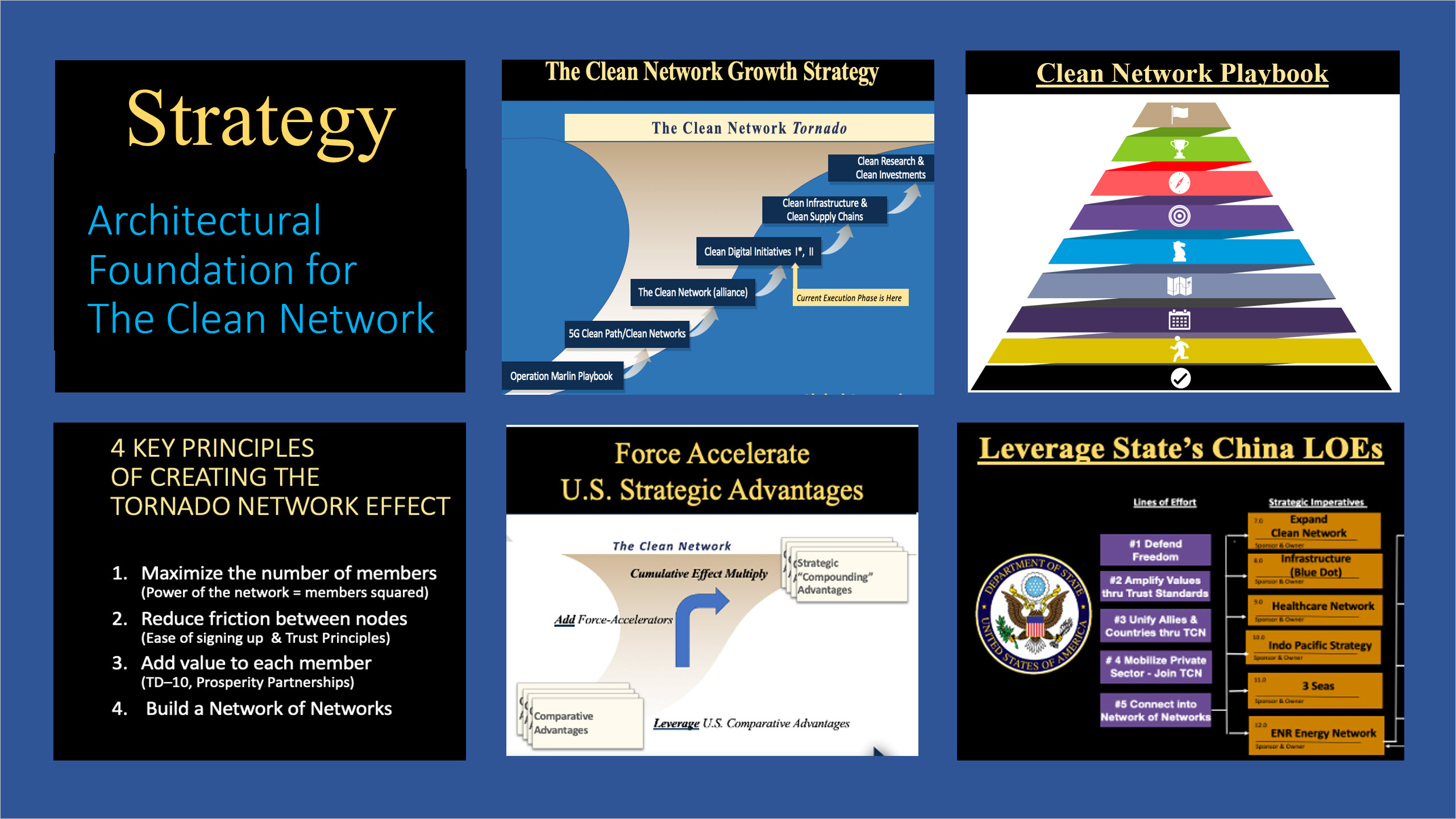
As the number of members and areas of collaboration grows and the brand builds, the power of the Clean Network increases at an exponential rate, according to Metcalf’s law for the network effect. It is the power of the Clean Network that enables it to accomplish its noble democratic mission. The core principles enable fast, frictionless, and trusted collaboration critical to the members’ shared future.
Once Krach and his Clean Network team were organized and empowered with a shared playbook, and the strategic positioning and chess moves were set, it was time to mount the offensive. The stakes were high because the CCP knew that Huawei was a proxy for their regime, and they would fight with everything they had. Krach knew he would have to swing into action with an opening salvo to put Huawei on the defensive. The press would end up calling it the “5G Trifecta.”
Part III
The Future of the Clean Network
The Alliance to Advance Democracy
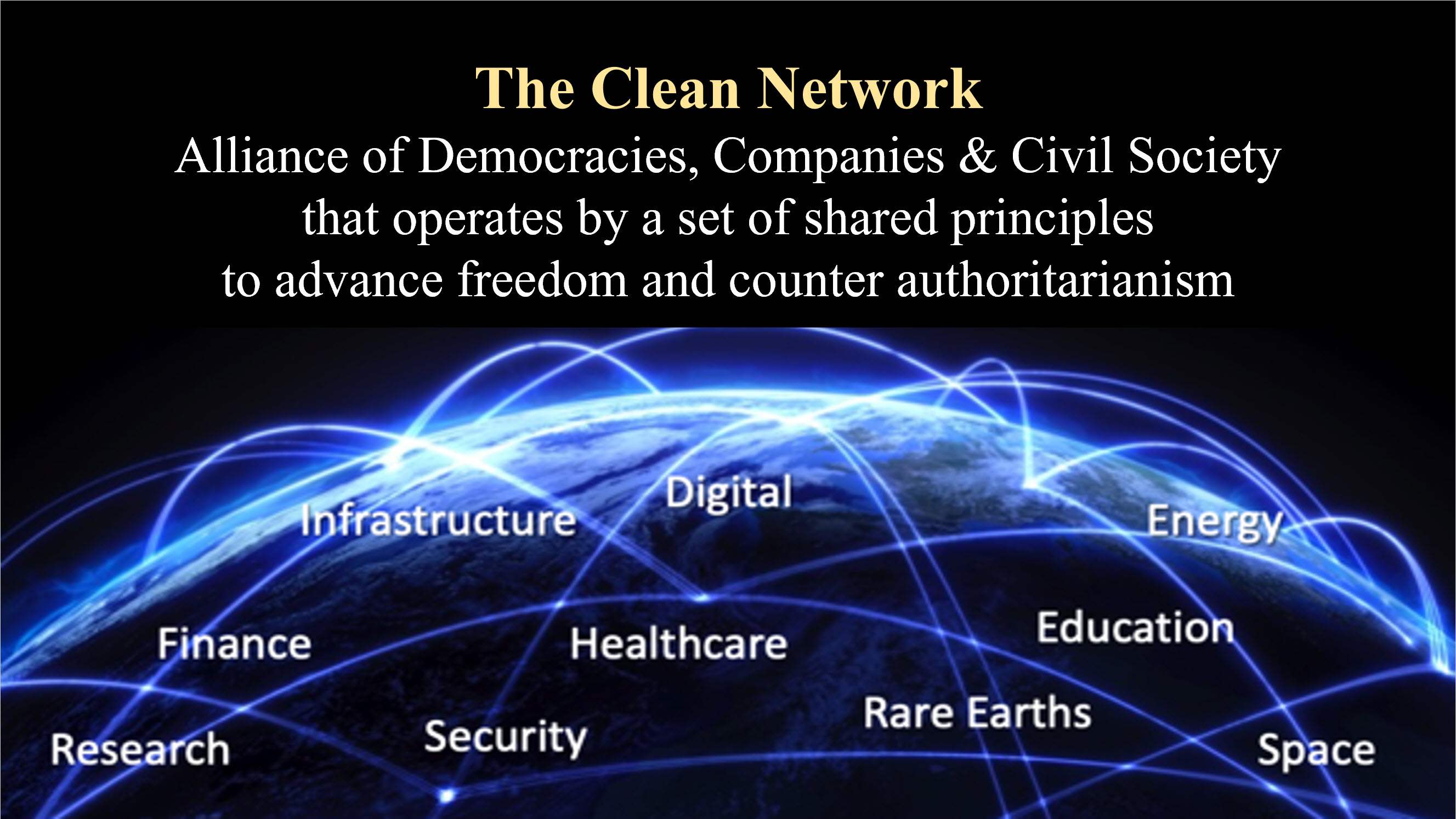
Strong Partnerships Advance Shared Prosperity
Krach has stated that the Clean Network is the first step in a bolder vision of constructing a network of networks—like-minded countries, companies and civil society that operate by a set of trust principles for all areas of collaboration. It is an alliance of democracies built on the idea that strong partnerships advance shared prosperity. The Clean Network harnesses the innovation, resources, and synergies of its members into an equitable and unifying geo-economic network that enables multiple areas of collaboration.
Krach’s belief is that strategy equals sequencing—and 5G Clean infrastructure is the initial beachhead which enables Clean Telcos, Clean Companies and Clean Countries as members. These members form the initial Network of Trusted Partners that manifests itself as free nations that stand together against authoritarianism.
The next chess move expands the product line with the first batch of Clean Initiatives announced—Clean Path, Clean Carrier, Clean Store, Clean App, Clean Cable, and Clean Cloud. In his Senate testimony, Krach shared his vision for the next wave that includes Clean Drones, Clean Data Centers, Clean Currency, Clean Data, Clean Drones, Clean Security, and Clean Things (IOT).
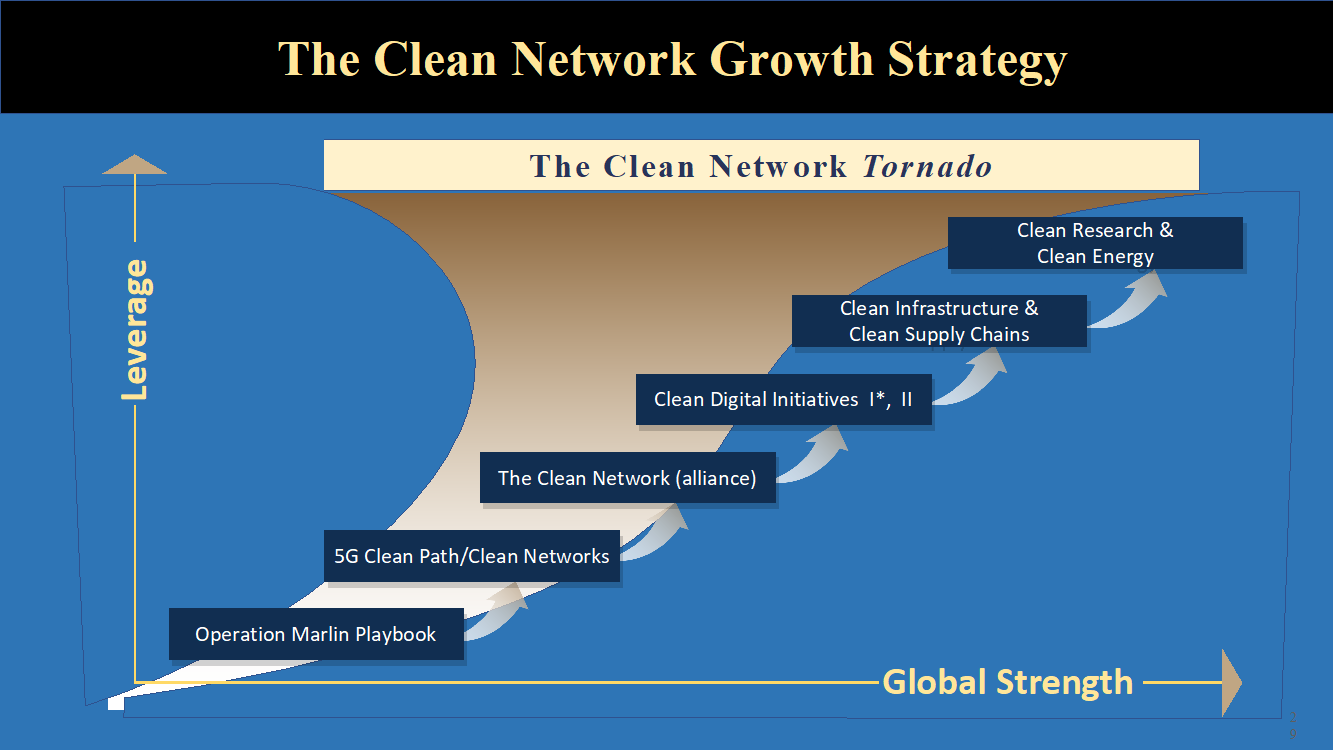
The next dimension of adjacent areas outside of tech have already begun—Clean Infrastructure and Clean Financing which is called the Blue Dot Network; Clean Minerals which is called the Energy Resource Governance initiative; and Clean Supply Chains with Clean Labor Practices. The CN also creates an umbrella network for existing regional initiatives like the Indo-Pacific Strategy, 3 Seas Initiative, Transatlantic Partnership, EU-Asia Connectivity Initiative and American CRECE.
Clean Network Represents Truly Bipartisan Values and Philosophy
The Trump administration has taken an aggressive stance against the proliferation of Chinese technology, labelling it a security threat and a tool for spreading Chinese influence. President-elect Joe Biden is expected to take a more measured approach diplomatically, but foreign affairs and technology experts say Beijing shouldn’t anticipate a significant softening. Biden will maintain a hard line on most matters, including export restrictions to Huawei, though he will probably enlist more support from international allies.
According to a recent Wall Street Journal article, President-elect Joe Biden is expected to “advance Washington’s tough, new attitude toward China, but with an approach that relies more on pressure from U.S. allies, sanctions and other tools to shape Beijing’s behavior.”
“These are two things that Biden and his people are talking about—the first is the outreach to allies and partners and like-minded states—democracies,” said Daniel Russel in a recent WSJ article, former Asia diplomat in the Obama-Biden administration, now at the Asia Society Policy Institute think tank. “Secondly is ensuring our policy and strategy are rooted in shared values, including human rights, democratic principles and market economies.”
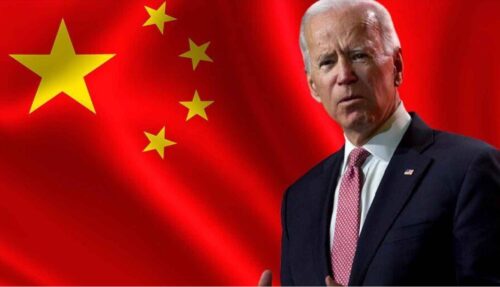
Krach’s Clean Network strategy of uniting allies and leveraging partners based on democratic values appears to align perfectly with Biden’s approach. The best way to confront China is by forming a “united front” with allies, he wrote in Foreign Affairs. “When we join together with fellow democracies, our strength more than doubles. China can’t afford to ignore more than half the global economy.”
Biden is also expected to pursue more funding for basic research and ease some Trump-era restrictions on immigration of the highly skilled, to give the United States more resources to compete in the tech economy. This may serve to push over the goal line two key pieces of bipartisan legislation that Krach has championed. The first is a $100 Billion technology research funding bill called the Endless Frontier Act, which Krach and his team has worked on with Senator Todd Young (R-Ind.) and Senate Democratic Leader Chuck Schumer (D-N.Y.). The second key piece of legislation is the Chip Act, which will fund onshoring for semiconductor companies like TSMC.
Clean Network and China Strategy
Another recent article cited that Biden would limit China’s influence by continuing to support the Clean Network plan of building alliances with allies, partners, and like-minded countries to promote values of human rights, democratic principles, and market economies. Biden has not yet laid out his detailed China strategy, but Biden aides are expected to adopt the State Department’s Clean Network and expand it to a broader set of commercial and strategic pacts to put pressure on Beijing.
It makes sense for the Biden administration to build on the accomplishments of the Clean Network. In contrast to some of the confrontational actions of the outgoing administration, the Clean Network bears the hallmarks of “good old fashioned” diplomacy. The Clean Network’s momentum has succeeded in strengthening relationships with long-time allies and rallying U.S. partners to take a stand against authoritarianism—fostering true collaboration based on shared democratic values.
Further, the Clean Network has demonstrated a rare genius for building effective public/private sector partnerships that leverage the innovation and resources of the world’s business leaders and entrepreneurs. Krach and his “E-Team,” through dedicated, creative, non-partisan outreach, have laid the foundation and future plans for a Network that needs to be expanded.
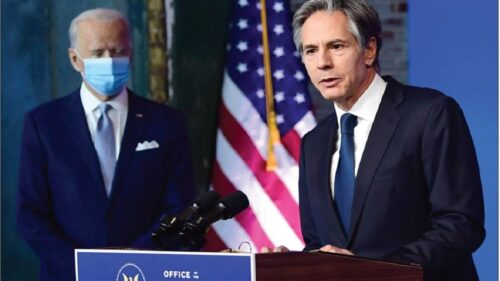
Biden’s pick for Secretary of State, Antony Blinken, laid out his strategy for pushing back on China’s various bad behaviors in a July Hudson Institute event, where he promised to rally allies and put our values back at the center of our foreign policy. “When we’re working with allies and partners, it’s 50 or 60% of GDP. That’s a lot more weight and a lot harder for China to ignore. China sees alliances as a core source of strength for the United States, something they don’t share and enjoy.”
Since July, Krach’s team has actually executed on that strategy by getting 53 countries, representing 66% of the world’s GDP, on the Clean Network and 180 Telcos on top of that. Krach has turned the tide on Huawei and the CCP’s 5G master plan.
And in the process, the Clean Network has also proven that China Inc. is beatable and most meaningfully, exposed its biggest weakness— lack of trust.
And who knows? Perhaps brought the world one step closer to having Mr. Xi tear down China’s Great Firewall.
The Great Firewall of China separates the Chinese people from the free world just as the Berlin Wall separated the German people from each other. The Berlin Wall is gone. Mr. Xi, tear down China’s Great Firewall. pic.twitter.com/uhozlKNFo7
— Under Secretary Keith Krach (@State_E) September 28, 2020
This is a three article series containing seven parts on The Clean Network
How the Clean Network Alliance of Democracies… >> Next >> Last




